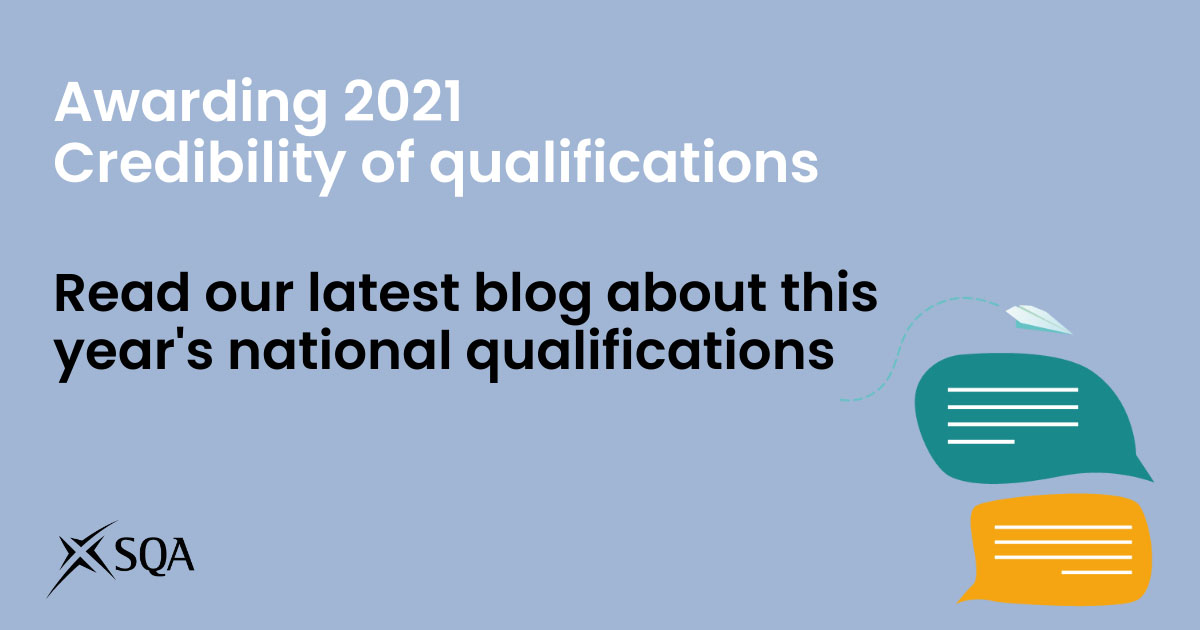Part of the challenge in developing and delivering the alternative certification model for this year’s National 5, Higher, and Advanced Higher courses has been ensuring the consistent application of national assessment standards in the face of the extensive disruption caused by the pandemic.
There was no easy solution to replicate the cancelled national examination diet. In the end, the National Qualifications Group 2021* agreed that the alternative certification model had to have evidence of young people’s learning and skills at its heart. And so provisional results, decided by teachers and lecturers using assessments completed by learners that followed the national standard set by SQA, were used to award this year’s National 5, Higher, and Advanced Higher courses.
Feedback from employers, and representatives of colleges, and universities showed that learners’ grades should be based on the evidence learners have been able to produce during their assessments, and the academic judgement of their teachers and lecturers based on the national standard.
Having an evidence-based system gives colleges, universities, and employers the reassurance they need when making decisions about who can enter their courses, and join their training programmes, and be recruited, based on the knowledge, and skills, and understanding individuals have been able to demonstrate to that point.
But how do you do this in a pandemic? How do you ensure everyone sits broadly the same assessment, under the same circumstances to the same national assessment standards when the national examination diet is unavailable?
Scotland benefits from a devolved education system where its local authorities deliver the day-to-day experience in the classroom. To deliver the alternative certification model needed to replace the national examination diet, SQA worked with its partners on the National Qualifications 2021 Group, and with stakeholders across the country to provide support to teachers and lecturers in understanding national assessment standards and applying it to their marking.
In addition, localised quality assurance procedures were put in place by schools, colleges, training providers and local authorities as a way of ensuring consistency from classroom to classroom.
Teachers and lecturers used their understanding of the national standard to make sure their approach to marking and making grading decisions was consistent across their cohorts.
SQA also took samples of candidates’ assessment evidence, adding further reassurance that national standards were being applied. In instances where schools, colleges and training providers had queries about the correct standard, we provided them with feedback and advice. This combination of local, and national quality assurance strengthens this year’s awarding approach.
That consistency gives this year’s assessment approach – and the grades awarded at the end of it – the credibility that learners and their families, as well as employers, colleges, and universities, are looking for. The qualifications awarded this year have the same currency and value as those awarded in previous years.
Qualifications will always be a crucial part of an individuals’ learning and training experience. They give us a goal to work towards, prove to others what we know, and what we can do, and help us distinguish ourselves from our peers. How they are delivered can vary according to circumstances, and preferences, but they will always align to the required standard. Qualifications are there to help us unlock the path ahead of us, and there is real value in that.
As we approach results day, which is always an important milestone in the lives of learners, let’s get behind our young people and recognise their achievements in this most challenging of times. They deserve our support and the reassurance that the grades they receive on 10 August are a recognition of their efforts and worth the same as grades awarded in any other year.
*The National Qualifications 2021 Group is represented by the Association of Directors of Education in Scotland (ADES), Colleges Scotland, Education Scotland, the Educational Institute of Scotland (EIS), School Leaders Scotland (SLS), the Scottish Council of Independent Schools (SCIS), Scottish Qualifications Authority (SQA), the Scottish Government, National Parent Forum of Scotland, and the Scottish Youth Parliament.







